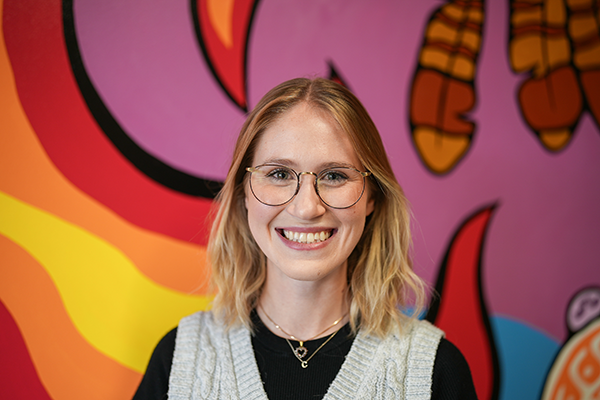Admissions
Equity, Diversity, Inclusion and Decolonization
The School of Graduate and Postdoctoral Studies is committed to equity, diversity, inclusion and decolonization in all aspects of graduate and postdoctoral studies. For more information regarding these commitments please visit grad.uwo.ca/edi-d.
Anthropology
Master of Arts (MA)Meet Sarah Bidinosti, MA candidate in Anthropology

Supervisor: Andrew Nelson
What is it about your grad program that enables you to thrive and be successful?
The people in the department, from professors, to administration, and my fellow grad students. Everyone is there to help one another do their best and achieve their goals. It’s a really supportive environment.
Describe your research.
I am working to standardize the application of age, biological sex, and stature estimations to computed tomography (CT) scans of mummies. These methodologies were developed for use on dry bones but have not yet been systematically translated to the digital realm. There is a push towards non-destructive and non-invasive research, and creating a standardized methodology promotes accuracy and reliability for best practices and ethical research.
Do you serve on any Department, Faculty, or University committees?
I am president of the Western Anthropology Graduate Society.
What’s the best advice you could give to someone considering applying to your graduate program?
When looking into programs and supervisors, do the research to find a professor who not only has similar research interests, but that you also get along with. Finding the right supervisor is so important because they are going to be the person you are working the most closely with throughout the course of your degree, and having a good fit will set you up much better for success.
Program Websites
Program Contact
Dianna Puzara (dpuzara2@uwo.ca)Graduate Program Coordinator
Department of Anthropology
Western UniversitySocial Science Centre Rm 3324
London, Ontario N6A 5C2
t. 519-661-2111 ext. 85080
f. 519-661-2157
Anthropology is dedicated to documenting and understanding human beings. It takes as its starting proposition the idea that we can only reach such an understanding by studying people wherever and whenever they have occurred and from both a cultural and biological perspective. As such, it is one of the most diverse academic disciplines and draws its inspirations from the social sciences, natural sciences and humanities.
Program Length
- 6 Terms (Full-time in all fields)
- 12 terms (Part-time in Applied Archaeology field)
Program Design
- Full-time study or part-time study (Applied Archaeology field only)
- Thesis-based
Funding Information
Applicants are encouraged to apply for the following scholarships (if eligible):
Tuition and Fees
Tuition and fee schedules (per term) are posted on the Office of the Registrar's website at http://www.registrar.uwo.ca/student_finances/fees_refunds/fee_schedules.html
Graduate Student Affordability Calculator
Use this helpful tool to estimate how much money you will need to pay for your tuition, fees, housing, food, and other necessities for a 12-month (three term) academic year.
Admission Requirements
- Four-year degree, honours or the equivalent, in anthropology, or an equivalent background in social sciences and/or the intended specialty.
- At least a 78% or a B+ average for all available 3rd and 4th year courses.
Students who do not have a degree in anthropology may be required to take specific courses to fill in their background in preparation for admission to the graduate program. Please consult the Graduate Chair for clarification.
Additional Requirements
- For admission to the applied archaeology stream, we also take into account professional experience gained since completion of undergraduate studies.
English Language Proficiency
Applicants whose first language is not English must furnish evidence of their proficiency in the use of the English language:
- The Test of English as a Foreign Language (TOEFL). Minimum acceptable score is 550 for the paper and pencil version, 213 for the computer version, or 86 for the internet version with no individual score below 20. [Western's TOEFL ID is 0984].
- The International English Language Testing Service (IELTS Academic). Minimum acceptable score is 6 out of 9.
- The Canadian Academic English Language Assessment (CAEL Assessment). Minimum acceptable score is 60.
- Fanshawe College's ESL Program. The requirement is graduation from Level 10, English for Academic Purposes, with a minimum 80% in all components.
Application Deadline
- International applicants: December 15
- Domestic applicants: January 15 Acceptance notification in mid-March.
Fields of Research
- Applied Archaeology
- Archaeology and Biological Anthropology
- Sociocultural and Linguistic Anthropology






